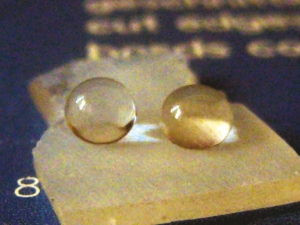It might be possible with a new class of highly fluorinated super-repellent polymer called a “fluoropore”, which mimics the natural ability of lotus plants and cabbage leaves to make water droplets simply roll away - but for oils too. This lotus effect has been used for producing rough surfaces with special chemical properties. “However, this trick does not work for oils – the lotus plant repels water, but no oil,” says Dr.-Ing. Bastian Rapp of the KIT Institute of Microstructure Technology. “Oil-repellent surfaces need to have another chemical structure, fluoropolymers, for this purpose.”
Fluoropolymers are high-performance plastics with a high heat resistance and chemical stability. Teflon, the known anti-stick coating material for frying pans, is a 20th century example.

“Fluoropore” repels water (left) and oil (right). These droplets do not adhere to or wet the surface. Photo: KIT/Rapp
“When combining the chemical properties of fluoropolymers with the roughness of the lotus plant, surfaces are obtained, from which both water and oil droplets will roll off,” Rapp says.
A 'lotus 2.0 effect' to create super-repellent surfaces has worked in the laboratory but have had insufficient stability in practice. A big problem has been sensitivity to abrasion and the new class of fluorinated polymers - “fluoropore” - will work on nearly all surfaces if it successful.
The research project was successful in the NanoMatFutur competition for young scientists launched by the Federal Ministry of Education and Research. Rapp’s project “Fluoropore – chemically inert, micro- to nanoporous ‘teflon’ with an adjustable wetting behavior”received a grant of EUR 2.85 million. Funds are granted to application-oriented fundamental research projects with a high industrial implementation potential.
Credit: Karlsruhe Institute of Technology





Comments